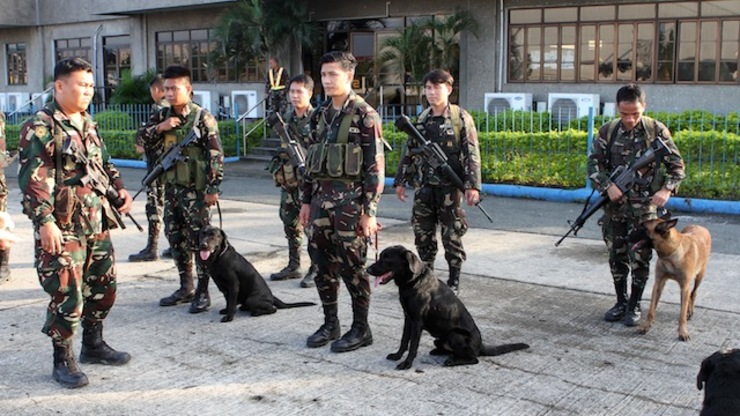MANILA, July 5 (Xinhua) -- An independent government institution has voiced concern over the lack of military dogs to protect Philippine President Rodrigo Duterte and foreign leaders who are in the country for a visit.
The alarm was raised as the Philippines, the chair of the Association of Southeast Asian Nations (ASEAN) this year, hosts a series of high-level ASEAN and ASEAN-related meetings.
The Commission on Audit (COA) said in a recent report that the Presidential Security Group (PSG), whose main job is to provide security for the president and visiting heads of foreign governments, has been operating with less than the minimum number of canines or K9s needed to do the job properly.
In a report released on July 1, COA said PSG only has 20 security dogs, or five short of the 25 required to protect the president "through effective bomb detection operations during presidential engagements."
COA said five more dogs will be retired in 2018 upon reaching the maximum service of eight years, leaving the PSG with just 15 canines.
As of Dec. 31, 2016, COA said 11 dogs have already retired and three more were recommended for retirement by the PSGs veterinary officer due to advanced age and diminished capability.
"With the 11 retired military dogs and five more expected to retire in 2018, the prime duty of the PSG of securing safety of the president may not be effectively carried out," the COA said.
Responding to the audit report, the PSG said it has made the request for additional money in its 2017 budget to buy 11 additional law enforcement dogs but their request "was not considered by the Higher Headquarters."
To augment its dwindling pack, the PSG said it has borrowed four dogs from the Armed Forces of the Philippines and the Philippine Army K9 units.
COA said the problem would have been prevented had the PSG anticipated early on that their aging bomb sniffer canines were retiring soon.
"The command did not procure any bomb dog for the last 12 years and almost all of the existing effective bomb dogs were acquired through donation," COA said.
It said the PSG could have also anticipated the tedious training or schooling of the dogs, and time needed to bond with its handlers.
"The acquisition and training of K9s necessitate a tedious process before they are utilized for military operations," the COA said.
Hence, it said "a reasonable inventory of military dogs should be maintained and that acquisition of such should be properly planned and completed on a timely manner to support the command's operation critical to bomb detection."
